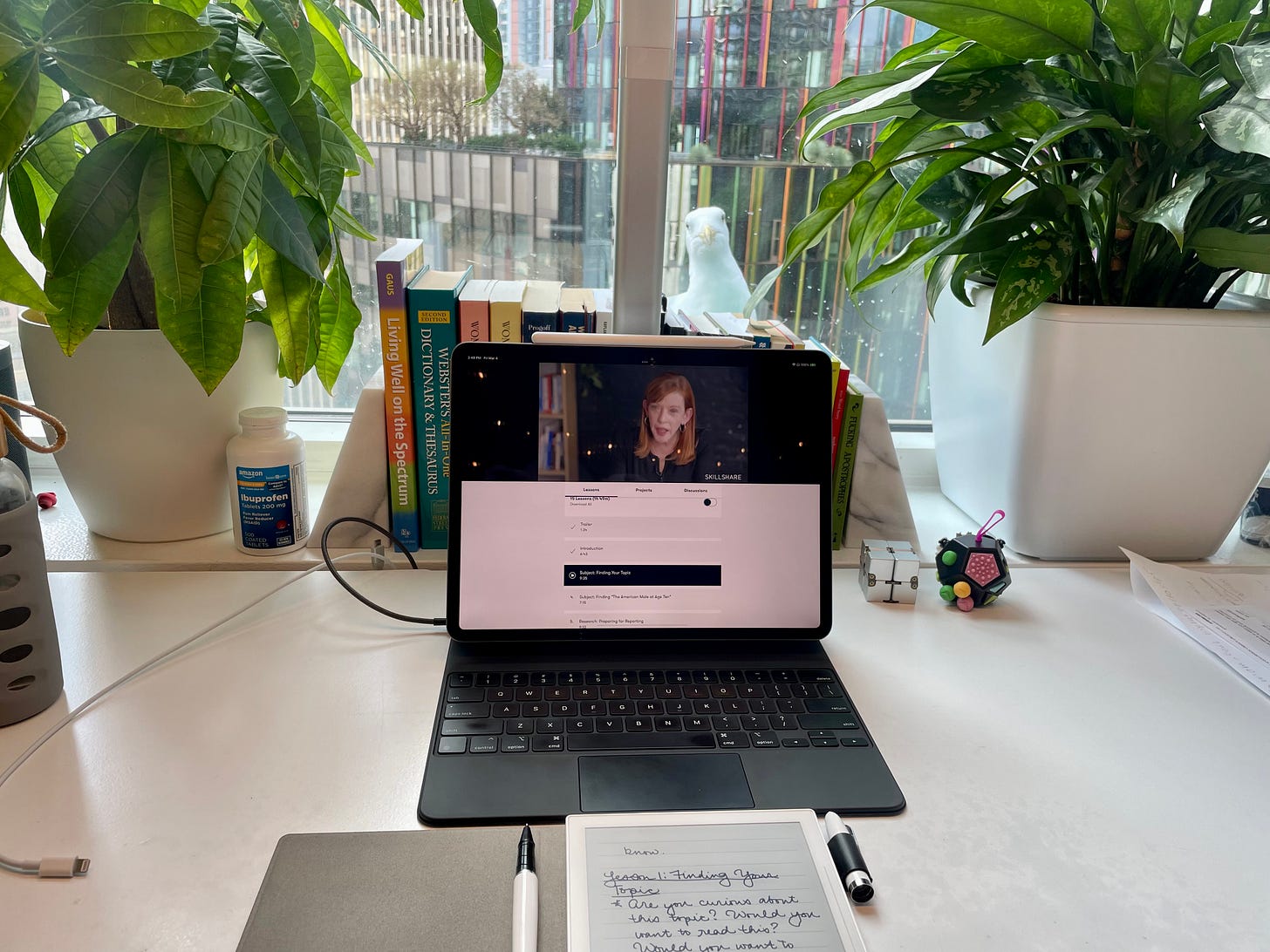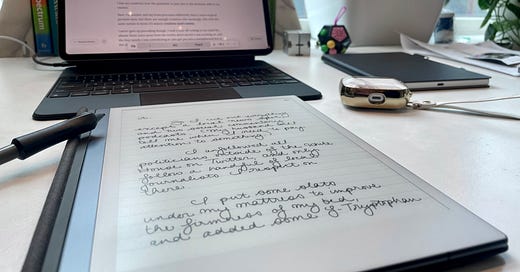Practicing Every Day Keeps Stagnation at Bay
tips to help rebuild a routine after it's been thwarted
This newsletter has moved!
To receive new and infrequent musings, the latest fiction and non-fiction narratives, updates, and "life nuggets”, subscribe here.
I'd gotten into a good flow state with writing after we moved, then my kids had a week off school and it totally threw me.
I've heard countless writers say things like "writers should never take a day off. Weekends, holidays—doesn't matter: write every day."
As someone who functions best with routines, I understand the sentiment. But what happens when you struggle with change in your routine? What if you deal with chronic illness or varying health status? Chronic brain fog?
How do you rebuild your routines after they’ve been shifted (or trashed)?
Let’s explore.
I lost my creativity over the pandemic in part due to the dramatic shift in my routine.
Sure, I'm Autistic and my brain processes differently than a neurotypical person’s does, but there are enough creatives who seemingly vibe with the same notion to know it’s sound: creatives need routine.
I took a year off writing to my email list, and almost three years away from the twelve short stories I was working on. And the four novels I was contributing to also got put into a metaphorical box in the closet for now.
At least I didn’t give up journaling. Small wins, right?
But I didn’t write every day.
My journal entries follow The Morning Pages approach where I’m essentially just long-hand brain-dumping everything flitting about in my head to clear space for creativity. But when my environment isn’t conducive (to me) to create, and when I over-schedule on top of that, non-journal writing takes a back seat.
So last week I focused on finding my flow state again.
It was tricky because there were more appointments (I swear it never ends), I had an anaphylactic response to a medication, and one of my children had a meltdown and needed to stay home from school. But in the small bit of time I had to work, I spent it:
Writing my Morning Pages, a concept by Julia Cameron. Instead of sticking to the formula of writing the 3-page (minimum) on a 20-minute timer, I kept going, kept writing beyond the limits previously set. Because I know I can go back to those pages and pull from them when I need to. Plus, I’ve been carrying a lot and really needed to just keep writing and unloading.
Perusing Skillshare writing courses for inspiration and to increase activity.
Reading Tell It Slant: Creating, Refining, and Publishing Creative Nonfiction* to sharpen my essay writing.
Listening to writerly podcasts like The Shit No One Tells You About Writing, and Writers on Writing, and older episodes of Aut-Hour (Autistic author interviews) in lieu of politics and news while cleaning or cooking.
Prioritizing my health needs. I noticed my plantar fascia pain was contributing to brain fog and an inability to concentrate. So I scheduled an appointment with my podiatrist, and bought some carbon fiber insoles* in the meantime, which have helped tremendously. I noticed I was dining out more often because cooking while flared feels like an impossible task. So I switched to primarily ordering salads, and that adjustment helped the brain fog element quite a bit. And, of course, the daily journaling helps keep my mental health in check, too.
And outside of the Autism appointments for myself and my children where you get what you get and you have to work around it (otherwise it could be weeks or even months to get another available slot), I’m going back to my time blocking (or time boxing) practice which I wrote about often for Goff Creative. I need to be firm with myself, and if it means I sit staring off into space all morning during my allotted writing time and not actually getting a single word down, then so be it. This isn’t a self-punishment or anything, but not getting on Reddit or texting someone instead of allowing myself some room to be with my own thoughts is absolutely more conducive to overall health and mental wellness. Sometimes it’s nice to take advantage of Do Not Disturb mode on your phone and just be in the moment with yourself.
Taking these steps to self-explore and expand your consciousness, we could say, can be healthy strides forward in rebuilding a displaced routine.

I don’t know if you write or not, but you can substitute “write” with something else for most of my points above. Plus, a couple of those steps could render useful in other areas of your life too.
Like, if you’re in pain, you’re likely not able to be [very] productive. Ask yourself: What’s causing my pain? What can I do about it? (Mental pain counts here too.)
Can you fix it on your own (without harming your body [e.g., long-term painkiller usage, etc.]), or do you need to seek help for it?
Also, time-blocking seriously works. And Morning Pages/practicing a short, daily journaling exercise can be incredibly helpful at clearing your mind to assist you in taking on whatever’s next.
These brief writing sessions don’t have to be in the morning, and they don’t have to be written by hand. You can type it up or use a voice memo on your smartphone, or whatever other creative way people take notes that I’m not hip enough to know about. You can also just set a short timer and list bullet points to help clear your mind.
I’ve done that plenty of times, too.
Contrary to the possibly dated advice of the Morning Pages concept creator, whatever works for you works for you. So do what works!
Out of everything, though, I’ve learned that, for me, I do need to “write” most every day. Even if it’s just setting a 20-minute timer to brainstorm ideas for future pieces or making a bulleted list of ideas or tasks, writing something is necessary for me to stay connected to myself and my work. Every day.
Lesson learned. (Hopefully.)
My best,
Sara
support my work and | “buy me a coffee” (a one-time tip)
offer ongoing support and | become a Patreon patron
get the | Content Strategy Planner
visit the website | segwrites.com





